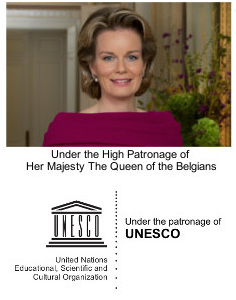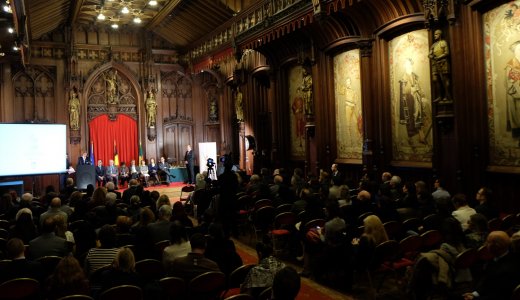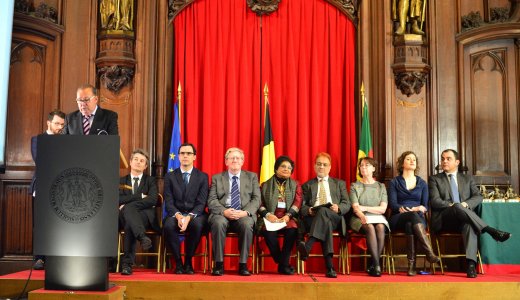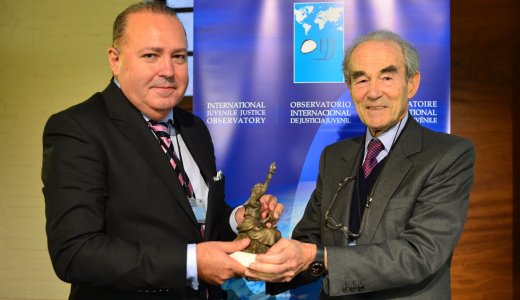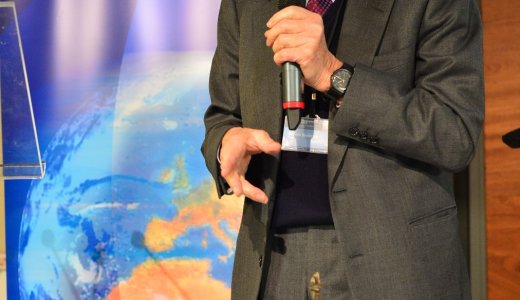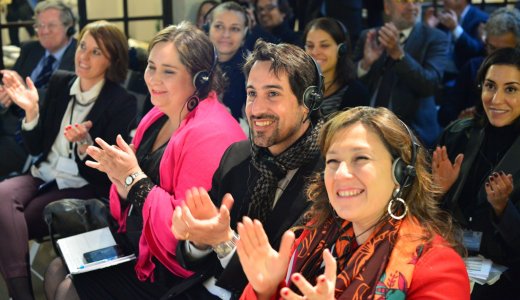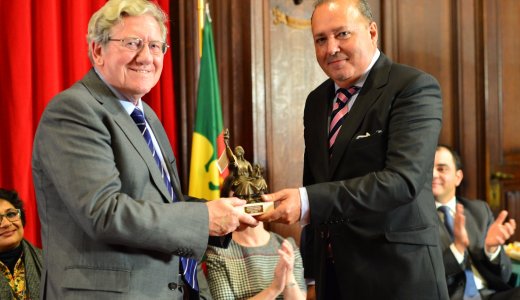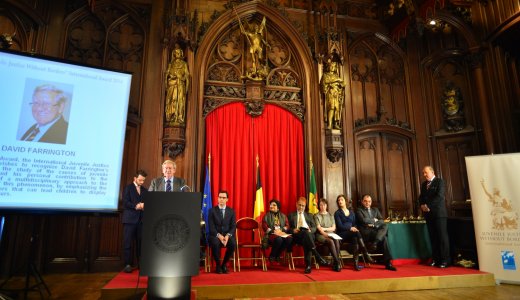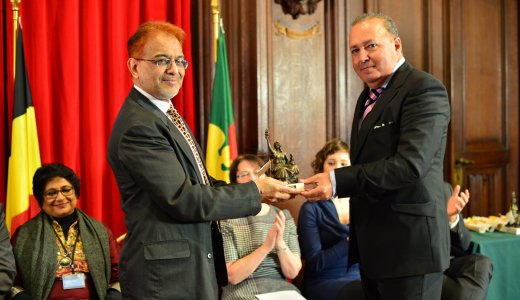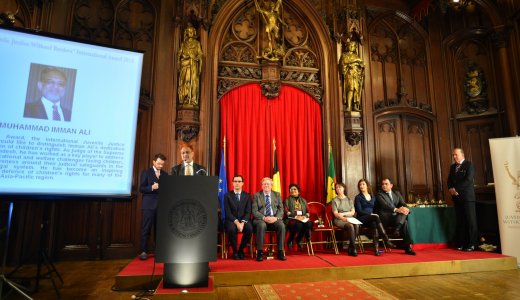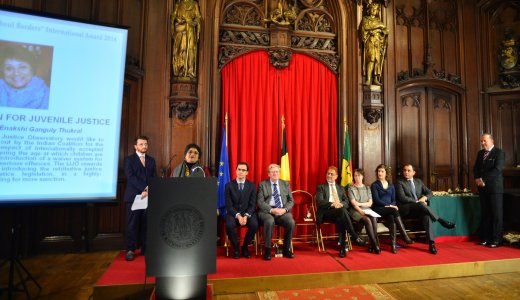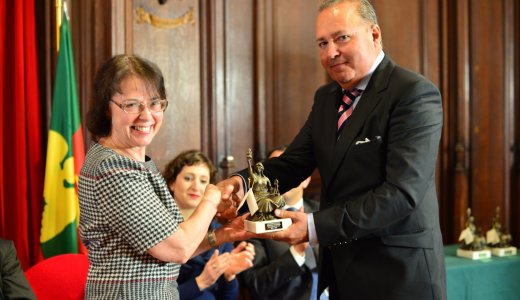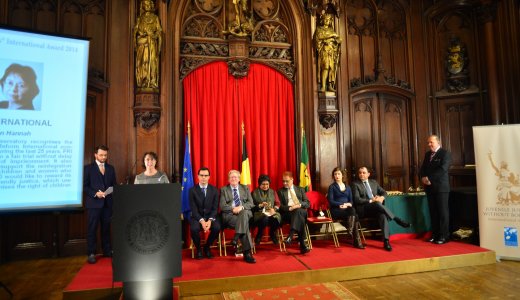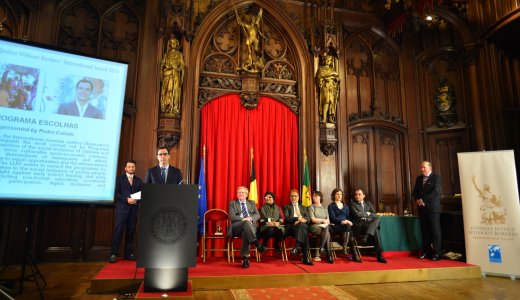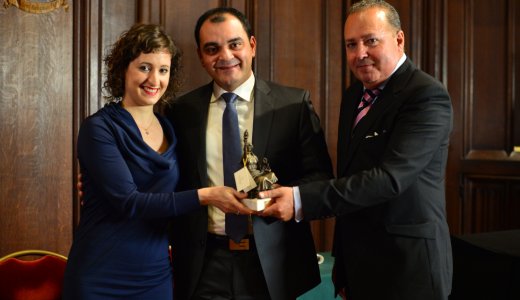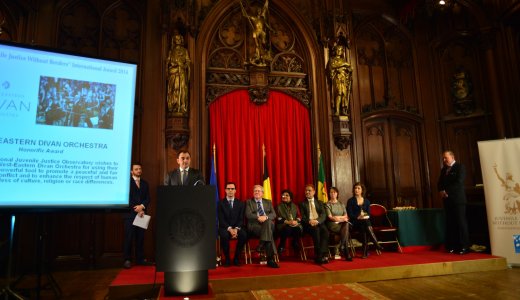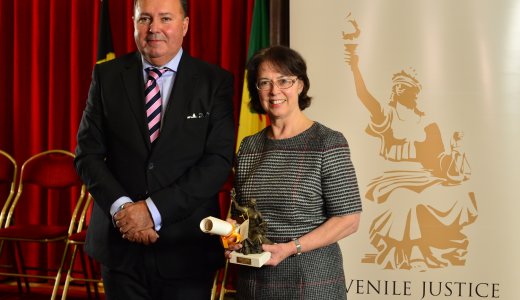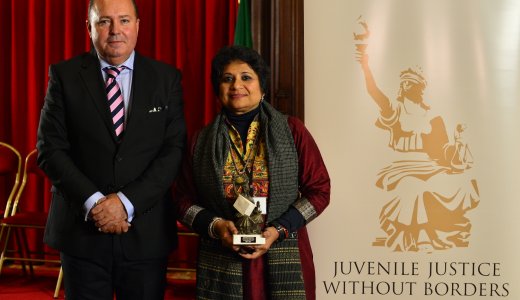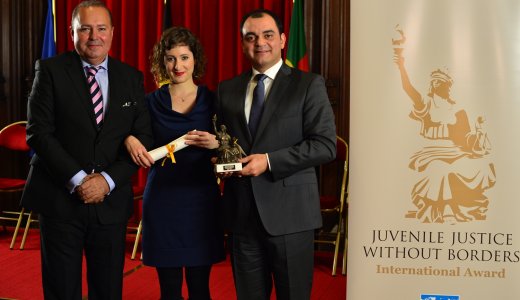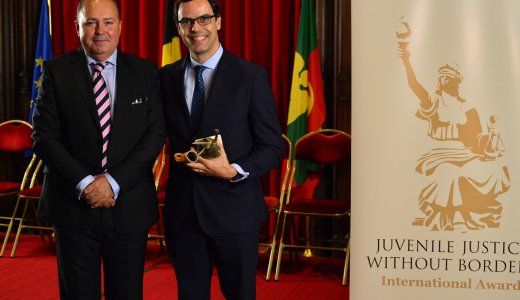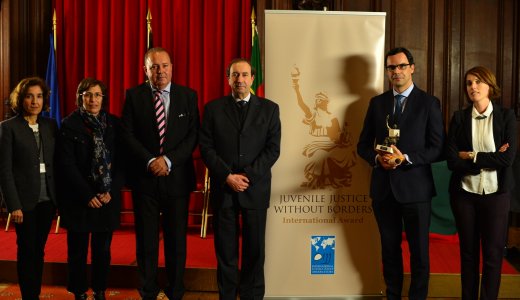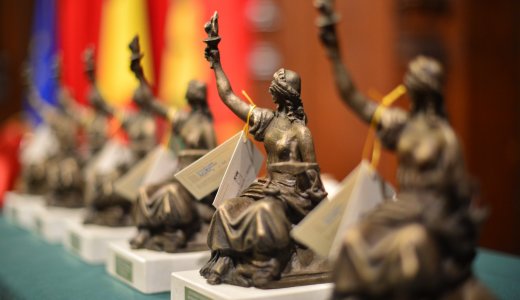The ceremony for the Third Edition of the ‘Juvenile Justice without Borders’ International Award took place in Brussels, Belgium, on December 3, 2014, at Brussels’ Town Hall (Hôtel de Ville, Salle Gothique).
This award was established in 2010 by the International Juvenile Justice Observatory (IJJO) with the aim of recognizing the work of experts, personalities and institutions of different fields that show a firm commitment towards the development of juvenile justice systems focused on the integral promotion of children and young people in conflict with the law, always under international rules and standards.
The ceremony was held in the context of the 6th IJJO Conference ‘Making Deprivation of Children’s Liberty a Last Resort: Towards Evidence-Based Policies on Alternatives’. The Conference addressed the need to improve the effectiveness of the policies and programmes aimed at breaking cycles of violence in its different stages, with the priority given to alternatives to detention, mediation and conflict resolution in a social, family and community environment.
Opening Speech
Francisco Legaz, Chairman of the International Justice Juvenile Observatory
Video: Dr. Francisco Legaz Cervantes Inaugural Speech
Video: Renate Winter Inaugural Speech
The winners of this third edition are:

WEST-EASTERN DIVAN ORCHESTRA
HONORIFIC AWARD
Conducted by Daniel Barenboim
For using their music as a powerful tool to promote a peaceful and fair solution to conflict and to enhance the respect of human rights regardless of culture, religion or race differences.
The members of the West-Eastern Divan Orchestra feel honoured by the acknowledgement of their unceasing endeavours through the Juvenile Justice without Borders International Award. Throughout its existence, the West-Eastern Divan Orchestra has proved that music can break down barriers previously considered insurmountable. It demonstrates that bridges can be built to encourage people to listen to one another. Music by itself can, of course, resolve neither the Arab-Israeli nor any other conflict. But it can bring home the validity of life experiences and narratives on all sides.
Members of the orchestra
Biography
For 15 Years now, the West-Eastern Divan Orchestra has been a significant presence in the international music world. In 1999, Daniel Barenboim and the late Palestinian literary scholar Edward Said created a workshop for young musicians from Israel, Palestine and several Arab countries to promote coexistence and intercultural dialogue. They named the orchestra after Johann Wolfgang von Goethe’s collection of poems entitled “West-Eastern Divan”, a central work for the development of the concept of world culture.
The West-Eastern Divan Orchestra’s first sessions took place in Weimar and Chicago. In 2002, it found a permanent home in Seville, Spain, where it is generously supported by the regional government of Andalusia (Junta de Andalucía). An equal number of Israeli and Arab musicians form the base of the orchestra, together with a group of Spanish members. They meet each summer in Seville for a workshop, where rehearsals are complemented by lectures and discussions and followed by an international concert tour.
The West-Eastern Divan Orchestra has proved time and again that music can break down barriers previously considered insurmountable. The only political aspect that prevails in the work of the WEDO is the conviction that there is no military solution to the Arab-Israeli conflict, and that the destinies of Israelis and Palestinians are inextricably linked. Through its work and existence the West-Eastern Divan Orchestra demonstrates that bridges can be built to encourage people to listen to the narrative of the other.
While music alone cannot resolve the Arab-Israeli conflict, it grants the individual the right and obligation to express himself fully while listening to his neighbour. Based on this notion of equality, co-operation and justice for all, the orchestra represents an alternative model to the current situation in the Middle East.
The orchestra is also a platform for the encounter between the world religions connected by the role of Israel and Palestine as a place of particular spiritual significance. Besides Jews and Muslims, its members include Christians from Catholic, Protestant and Eastern Orthodox congregations to which a significant minority of Arabs belongs.
The Orchestra’s repertoire expands beyond symphonic works to opera and chamber music performances. Concert highlights have included performances at Berlin’s Philharmonic Hall, the Teatro alla Scala in Milan, the Musikverein in Vienna, Carnegie Hall in New York, the Tchaikovsky Conservatory in Moscow, the Hagia Eirene Museum in Istanbul, the Salle Pleyel in Paris, the Plaza Mayor in Madrid and the Teatro Colón in Buenos Aires as well as a concert in honour of Secretary-General Kofi Annan at the General Assembly Hall of the United Nations in New York in December 2006. The orchestra is a regular guest at the BBC Proms and festivals such as Salzburg or Lucerne.
The West-Eastern Divan Orchestra has released a number of highly acclaimed CDs/DVDs. These include live recordings of Tchaikovsky: Symphony No. 5 / Verdi: overture from La Forza del Destino / Sibelius: Valse Triste (2004); the emblematic concert at the Cultural Palace in Ramallah (2005); Beethoven: 9th Symphony (2006); Mozart: Sinfonia Concertante in E-flat / Beethoven's Leonore Ouverture (2007); and Schönberg: Variations for Orchestra / Tchaikovsky: Symphony No. 6 (2011); the complete Beethoven symphony cycle (2012). The documentary “Knowledge is the Beginning” by Paul Smaczny has won several awards, among them an International Emmy (2006). Most recently a recording of Berlioz Symphonie fantastique in July 2013.

ROBERT BADINTER
Former Minister of Justice of France and former President of the French Constitutional Council.
For his outstanding work and personal engagement to fighting against the death penalty, to improving the rights of victims and the development of non-custodial sentences, in particular during his mandate as Minister of Justice, and as a human rights activist.
Je suis très sensible à cette distinction venant d’une institution qui œuvre avec conviction et ardeur à l’amèlioration de la justice des mineurs. Je vous prie de transmettre aux membres du jury l’expression de ma reconnaissance.
Robert Badinter
Biography
Robert Badinter has been a Senator of the French Senate from 1995 until 2011. During his distinguished career, he has also been Minister of Justice (1991-1996), President of the Constitutional Council (1986-1995), President of the Arbitration Commission for Former Yugoslavia (1992-1995), member of the Brussels Convention for the European Constitution (2003) and of the High level Panel appointed by Secretary general Kofi Annan (2003-2004). Robert Badinter has been a long time activist for the abolition of the death penalty. He is member of the International Commission against the Death Penalty.
Robert Badinter holds the highest degrees from the Sorbonne, and a M.A. from Columbia University. He was appointed Professor of Law at the Sorbonne in 1965 (Emeritus since 1996). He is the author of L’Exécution (1973), Libertés, Libertés (1975), Condorcet, an intellectual in politics, in collaboration with Elisabeth Badinter (1988), Free and equals, the emancipation of the Jews 1789-1791 (1989), Another justice (1990), The Republican Prison 1873-1914 (1993), C.3.3. (with a foreword on Oscar Wilde and justice) (1995), Ordinary anti-Semitism : Vichy and the Jewish lawyers 1940-1944 (1996), The Abolition (2000), An European Constitution (2002), Against Death Penalty (2006), Les Epines et les Roses(2011).

DAVID FARRINGTON
Emeritus Professor of Psychological Criminology and Leverhulme Trust Emeritus Fellow in the Institute of Criminology, Cambridge University.
For his dedication to the study of the causes of juvenile delinquency and his personal contribution to the development of a multidisciplinary approach to the investigation of this phenomenon, by emphasising the variety of factors that can lead children to display criminal behaviours.
I am delighted and honoured to receive the Juvenile Justice without Borders International Award. It will greatly stimulate me in my efforts to encourage early intervention to save children from a life of crime and to make policy makers aware of the many effective programmes that can help children at risk to lead successful lives. These programmes not only prevent crime and increase life success but they also can save a lot of money for governments by avoiding criminal justice processing. Prevention is better than cure!
David Farrington
Biography
David P. Farrington is Emeritus Professor of Psychological Criminology and Leverhulme Trust Emeritus Fellow in the Institute of Criminology, Cambridge University. He will receive the August Vollmer Award of the American Society of Criminology in 2014. He received the Stockholm Prize in Criminology, and the Freda Adler Distinguished Scholar Award of the ASC Division of International Criminology, in 2013. He is Chair of the ASC Division of Developmental and Life-Course Criminology. He has been President of the American Society of Criminology, President of the European Association of Psychology and Law, President of the British Society of Criminology, President of the Academy of Experimental Criminology, Chair of the Division of Forensic Psychology of the British Psychological Society, Chair of the UK Department of Health Advisory Committee for the National Program on Forensic Mental Health, Vice-Chair of the US National Academy of Sciences Panel on Violence, and Co-chair of four OJJDP, NIJ, and CDC Study Groups. He has received the Sellin-Glueck and Sutherland Awards of the ASC, the European Association of Psychology and Law Award for Outstanding Career-Long Contributions, the Joan McCord Award of the Academy of Experimental Criminology, the Jerry Lee Award of the ASC Division of Experimental Criminology, and the Robert Boruch Award of the Campbell Collaboration. His major research interest is in developmental criminology, and he is Director of the Cambridge Study in Delinquent Development, a prospective longitudinal survey of over 400 London males from age 8 to age 56. In addition to over 600 published journal articles and book chapters on criminological and psychological topics, he has published nearly 100 books, monographs and government reports.

MUHAMMAD IMMAN ALI
Judge of the Supreme Court of Bangladesh.
For his dedication to the protection of children’s rights. As judge of the Supreme Court of Bangladesh, he has worked as a key player to address the social, educational and welfare challenges facing children, by raising awareness around their judicial safeguards in the Bangladesh legal system. He has become an inspiring example of the defence of children’s rights for many of the countries of the Asia Pacific region.
It is a great honour for me and for Bangladesh to receive this prestigious award from IJJO. I am truly humbled by your gesture. It is recognition of years of serious endeavours to change the lot for the 70 million children of Bangladesh. One cannot deny that children across the globe are vulnerable and in need of care and protection. Those who fall foul of the justice system, i.e. in conflict with the law, are more in need of our attention because they find themselves in an inextricable cycle of crime for which they were not themselves responsible. I am greatly encouraged by the award from IJJO to do much more for our children. Children who are well looked-after will make good, productive citizens resulting in economic prosperity for our nations.
Juez Muhammad Imman Ali
Biography
Honourable Justice Muhammad Imman Ali was educated in the UK where he did his schooling and completed his law degree, LLM and qualified as a Barrister-at-Law. He received the Duke of Edinburgh Scholarship for Call to the Bar by the Honourable Society of the Inner Temple. He has practiced law in both Bangladesh and the UK. He was elevated as Judge of the Supreme Court of Bangladesh, High Court Division in February 2001 and Appellate Division in February 2011. He was Deputy Attorney General for Bangladesh from September 1998 to February 2001. His book, “Towards a Justice Delivery System for Children in Bangladesh”, was published by UNICEF in 2010. He has also written a chapter on the new Children Act 2013 in the book “Justice for Children in Bangladesh” by Najrana Imaan published by Save the Children. Several of his articles on justice for children have been published. He has lectured at the Judicial Administration Training Institute training judges of the subordinate judiciary and lectured at the Legal Education Training Institute and Aparajayo Bangladesh, training lawyers and other relevant actors on the Children Act and other relevant instruments. Justice Ali has also been involved in training organised by IOM/LETI for police personnel, government officials and other actors involved in dealing with victims of trafficking. He was engaged in training Judges, Prosecutors and Police in Armenia on juvenile justice. He has attended many national and international conferences, seminars and workshops on International Law and Human Rights, and has a particular interest in justice for children.

INDIAN COALITION OF NGOs
For the struggle against the non-respect of internationally accepted principles, in particular lowering the age at which children are deprived of liberty and the introduction of a waiver system for 16-18 year olds committing serious offences, and for its advocacy work against introducing the retributive justice approach in juvenile justice legislation, in a highly-charged national context calling for more sanction.
The award comes to us at a very crucial juncture, while we still continue to struggle for restoration of internationally accepted principles and rules of juvenile justice in our country. The struggle has just begun and we thank IJJO for recognising the efforts being put in. It certainly is a motivator to keep us going as we now move on from the courts to the policy makers and legislators (…). This award in fact provides us an international platform to share our concerns and seek international solidarity on our position vis-a-vis juvenile justice. While fighting for children in conflict with the law, concerns of public safety are equally challenging and hence the world needs to come together to establish and demonstrate the efficacy of restorative justice models as against the retributive justice approach, especially in the context of young offenders.
Enakshi Ganguly Thukral
Biography
The Trust Centre for Child and the Law-National Law University (Bangalore), the Centre for Criminology and Justice - Tata Institute for Social Sciences (TISS), Jagori, Aangan and the HAQ: Centre for Child Rights have set up a Coalition in India in order to develop efficient strategies to stimulate the adoption of policies and legislation and to develop appropriate intervention methods for children in conflict with the law.
The Trust Centre for Child and the Law (CCL) was established in 1996 as a specialized Research Centre of the National Law School of India University, Bangalore, to combine legal expertise with the social sciences in the field of children rights. The Centre for Criminology and Justice focuses on social pathology, social construction of crime and violence and issues of prevention and access to justice. Jagori means "awaken, women!" and it mission is to inform, inspire and empower women and young girls. Aangan works with children in dangerous situation, such as child trafficking, hazardous work, early marriage, harm and abuse. HAQ: Centre for Child Rights strives to propel child rights into all mainstream development efforts, governmental and non-governmental, and place it on the centre stage of national debate.
A number of advocates working in Court are also part of the coalition: Anup J. Bhambani, Anant Kumar Asthana, Imran Ali, Mohit Abraham, Sudarsh Menon, and Vrinda Grover.
This coalition includes other members, as part of the support group: Dr. Shantha Sinha, Dr. Bharti Sharma, Child Rights and You (CRY), Maharukh Adenwala, Minna Kabir (Chief Justice of India) and Sruthi Ramakrishnan.
Enakshi Ganguly Thukral
Enakshi Ganguly Thukral is a human rights activist and child rights advocate, researcher and trainer for the past three decades, working on wide- ranging socio-legal issues such as development induced displacement, women in the unorganised sector, reproductive health, child labour, child trafficking, laws and policies governing women and children, education, violence against children and juvenile justice.
Since co-founding HAQ: Centre for Child Rights, in 1998, she has been working in focused manner on children’s rights. Working on children and governance, and child protection, HAQ is actively engaged in monitoring government’s performance, public education and advocacy on children’s rights. It works as a resource and support base providing information, referral service, legal aid, strategic litigation, training and capacity building of all those working with children or on issues concerning them, and the children themselves. It was one of the organisations that had intervened in Supreme Court of India against the plea for lowering the age of juvenility.
Enakshi has been part of drafting committees of laws, polices and plans of the government of India including the for the government’s Five Year Plans. She is the president of Society for Rural and Tribal Initiatives (SRUTI), Delhi, on the board of several organizations including the National Gender Centre of the Lal Bahadur Shastri Academy of Administration, Government of India; member of the Editorial Board of “Children, Youth and Environments”- A Journal of Research, Policy and Applications, University of Colorado; the thematic group for the World Congress on Juvenile Justice, Geneva, January 2015. Enakshi has authored and co-authored a number of books, articles, manuals and handbooks on a wide range of issues; been invited as a technical expert on issues related to children, presented papers at various national and international meets, worked closely with the UN system. She has been awarded the Ashoka Fellowship in 2002 in recognition of HAQ’s work on children.

PENAL REFORM INTERNATIONAL
For their work and engagement carried out during the last 25 years, advocating for the rights of defendants to a fair trial without delay and an end to the unnecessary use of imprisonment; for their promotion of alternatives to prison which support the reintegration and the improvement of the rights of children and women who come into contact with the law; and for their work for the development of a child-friendly justice, which uses detention only as a last resort and recognises the right of children to special protection.
We are very honoured to receive this Award from the International Juvenile Justice Observatory, whose work is unique in this field and for whom we have enormous respect. Over the past 25 years, PRI has carried out advocacy and reform programmes to improve the lives of children in conflict and in contact with the law. To achieve this, we produce advocacy, training and resource materials, and train a wide range of professionals working in the juvenile system in many countries – over 600 in the Middle East and North African countries alone. We advocate for detention to be used only as a measure of last resort, and for an end to violence towards children in detention. We seek the development and extension of restorative approaches to juvenile justice that promote diversion and mediation services to prevent the harm caused by placing children in detention. We are very appreciative of the recognition that the Award gives us for this work and for the ongoing interest from the IJJO for our commitment to promoting the rights of children caught up in the criminal justice system.
Alison Hannah
Biography
Penal Reform International (PRI) is an international nongovernmental organization (founded 1989) working on penal and criminal justice reform worldwide. It advocates for the rights of defendants to a fair trial without delay, and an end to the unnecessary use of imprisonment. It promotes alternatives to prison which support the reintegration and rehabilitation of offenders and reduce the likelihood of re-offending. It also promotes the rights of detainees to fair and humane treatment, campaigns for the prevention of torture and the abolition of the death penalty, and works to ensure just and appropriate responses to children and women who come into contact with the law.
In particular, justice for children is one of its priorities. PRI supports child-friendly justice systems which use detention only as a last resort and recognise the right of children to special protection. Such a system prioritises crime prevention; increases the age of criminal responsibility; sets up a separate criminal justice system for children with trained staff; abolishes status offences; diverts children from formal criminal justice systems wherever possible and uses detention only as a last resort; focuses on reintegration and rehabilitation programmes; and prohibits all forms of violence against children in conflict with the law.
PRI works with inter-governmental organisations to bring about reforms that balance the rights of offenders and of victims, and provides practical assistance to national policy-makers, criminal justice authorities and civil society to reform legislation, policy and practice. It has consultative status at the United Nations (ECOSOC), the Inter-Parliamentary Union, the African Commission on Human and Peoples’ Rights, the African Committee of Experts on the Rights and Welfare of the Child and the Council of Europe.
Alison Hannah, Directora Ejecutiva de Penal Reform International
After graduating with a Social Science degree, Alison started her career working at the National Council for Civil Liberties (now Liberty) in the legal section, working on prisoners’ rights and complaints against the police. She left to study law and train as a solicitor, specialising in legal aid cases in private practice and as a community lawyer for a Citizens Advice Bureau. She left practice to work for the Legal Aid Board when they started to introduce a quality assurance system for lawyers; subsequently leaving to become head of quality assurance and training for a not-for-profit company providing residential care for old people. She later gained a Master’s degree in Business Administration and worked in senior management in the charity sector. Before joining Penal Reform International in June 2007, Alison was Director of the Legal Action Group, a UK charity that promotes access to justice through legal aid.
Penal Reform International is an independent non-governmental organisation that develops and promotes fair, effective and proportionate responses to criminal justice problems worldwide. We aim to reduce the unnecessary use of imprisonment and promote alternatives to prison that support the reintegration and rehabilitation of offenders and reduce the likelihood of reoffending. We promote the rights of detainees to fair and humane treatment and we work to ensure just and appropriate responses to children and women who are in conflict with the law. To achieve these ends we advocate for change at international, regional and national levels; we work with governments and civil society partners to implement practical programmes at national level; and we produce capacity-building tools and training to improve the skills of people working in the criminal justice system.

‘CHOICES’ PROGRAMME
High Commission for Immigration, Presidency of the Council of Ministers (Portugal).
For their work in the promotion of the social inclusion of children and young people from more vulnerable socio-economic contexts, particularly of the descendants of immigrants and ethnic minorities, with a view to equal opportunities and the enhancement of social cohesion; and for the contribution it makes to the social inclusion of young people, in particular in the fight against early school leaving, and early prevention, by promoting non-formal education, vocational training, community participation, digital inclusion and empowerment.
The focus on early prevention, on localism, and in the ability to promote resilience are basic principles of Programa Escolhas since its origin. This award recognises the added value of this intervention, giving us - above all - even more determination to continue this path.
Programa Escolhas was initiated in January 2001, being subsequently renovated and it’s currently in its 5th iterative phase, which will run until December 31, 2015. In each one of the phases, the Programme has improved on its predecessor, learning from its practices and adapting to changing needs.
This award will reinforce and take to an upper stage the activities built over the last years, raising awareness on the importance to invest in the combat against social exclusion and in the defence, promotion and realisation of human rights and democratic values especially in the most disadvantage communities in Portugal.”
Pedro Calado
Biography
Programa Escolhas (the Choices Programme) is a national programme of the Portuguese government for social inclusion under the Ministry of the Presidency of the Council of Ministers, and is part of the High Commission for Migration. The Programme was created to promote the social inclusion of children and youths of the most vulnerable communities, particularly the descendants of immigrants and other ethnic minorities.
The Choices Programme was created in January 2001 and is currently in its 5th iterative phase, which will run until December 31, 2015. The programme is currently financing 110 social inclusion projects in vulnerable communities throughout the country. The projects are defined by local consortia of partners (schools, NGOs, municipalities, etc.) that comply with a set of rules set out in Portuguese law (Normative Dispatch n. 27/2009). The projects are designed in five main categories: 1) School inclusion and non-formal education; 2) Vocational training and employability; 3) Community and civic participation; 4) Digital inclusion; and 5) Entrepreneurship and empowerment.
Since its beginning the Programme has become increasingly recognized for the contribution it makes to the social inclusion of young people, namely in the fight against early school leaving and youth delinquency. The external evaluation reports of the Choices Programme highlight the evidence of the impact the Programme has achieved, namely the: ability to adapt the Programme, through successive generations, to meet the challenges emerging in Portuguese society; contribution to the empowerment of civil society organizations through creating co-responsibility for outcomes and mobilization of resources; recognition that the Choices Programme deals with "core issues" of inclusion and that its design is appropriate, consistent and relevant in the national context; connecting the local partners and the State to adequately respond to the issues of families in the communities in which they work; enabling of the local partners to empower young people with the skills and knowledge that constitute a competitive advantage for social and professional integration; development of partnerships essential to success.
Each generation of the programme has improved on its predecessor, learning from its practices and adapting to changing needs. The recent focus on employability and entrepreneurship (4th and 5th generations, since 2010) answers the challenges of the new socio-economic context of the country, and builds on the best practices of the past, while exploring new solutions for the future.
In the last phase of the Programme (January 2010 to December 2012) the following 6 global results can be stressed out when analysing the impact on the participants: 89.232 participants; 759.819 work sessions; 9.776 re-integrations into school, training and employment of children and young people previously unoccupied (NEET); 86.7% of overall school success in 2011/2012; 13.949 certifications in ICT; 50,3% of participants are females, 49,7% are males; 44% of youngsters targeted are descendants of immigrants.
Therefore, alongside the 110 projects, the Cabinet Resolution that defined the 5th generation established the opportunity to fund a further 30 projects (15 in 2014 and 15 in 2015). These are annual experimental projects based on creative and sustainable responses, with a clear focus on employability, job placement and business development. They are particularly designed for young people living in the most vulnerable areas, mainly comprised of descendants of immigrants and ethnic minorities. The specific call for proposal for 15 annual projects on inclusive entrepreneurship resulted in 263 applications from all over the country, including the autonomous regions of the Azores and Madeira. Following the final pitch presentation the jury evaluated the projects and selected those for implementation.
Pedro Calado
Pedro Calado is currently working as the High Commissioner for Migration (www.acm.gov.pt), and the National Coordinator of Choices Programme (www.programaescolhas.pt). The Choices Programme is a Portuguese government program created in 2001 to promote social inclusion and equal opportunities for children and young people living in vulnerable contexts.
Graduate in Geography from the University of Lisbon, with a specialisation in education, holding a Master's degree in Geography from the University of Lisbon/University of Sheffield, with a specialisation in "Exclusion, Society and Territory". In 2011 he took the Insead Social Entrepreneurship Program. Consultant and external evaluator in various organisations such as the Calouste Gulbenkian Foundation, he is also founder and volunteer in various organizations of the third sector.
Pedro Calado was the Choices Programme delegate in the European Youth Crime Prevention Network (EUCPN) and the award winner of 2003 edition of the European Heinz Roethof Prize, attributed by the European Union.
Researcher and university invited professor in several higher education institutions, with numerous academic articles published in the fields of social inclusion, urban violence prevention, immigration/ethnic minorities and formal and non-formal education subjects. Pedro Calado is also a professional trainer in the fields of social innovation, social inclusion, social entrepreneurship and migration issues.
